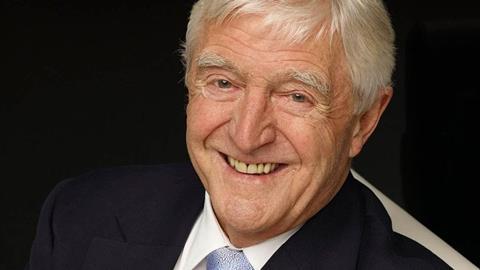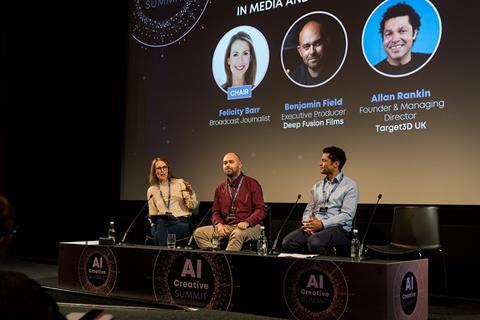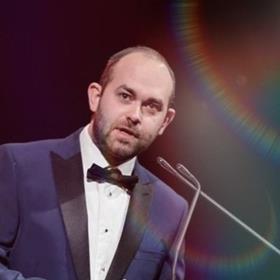Benjamin Field of Deep Fusion Films explains the thinking behind his AI-driven podcast with a virtual Sir Michael Parkinson

It’s been a busy two weeks at Deep Fusion Films since our AI Podcast was initially leaked into the press courtesy of a tabloid newspaper. The media has actually been quite kind to us over this – given the potential for doom-mongering headlines, we’ve been happy with the treatment we’ve been received.
By way of a recap to those that don’t know, this project, called Virtually Parkinson, is built around an AI-generated version of the legendary Sir Michael Parkinson and it was designed with a clear purpose: to examine our interactions with artificial intelligence through the familiar, thoughtful lens of a trusted media figure. As the producer, my goal wasn’t just to recreate Parkinson’s voice but to bring his unique interviewing spirit to life in a way that asks bigger questions about technology, legacy, and human connection.
That said, there’s obviously been quite a lot of noise around the creation of an AI version of Sir Michael Parkinson and it’s understandably had a lot of people feeling unsure of it all but I think many people – not all – have heard the headline but ignored the story and last weeks Broadcast Tech AI Summit sort of proved that quite nicely.
I talked about not just the podcast, but also the work we’re doing in writing policy to ensure that safeguards are in place to protect the industry from AI. We spoke at length at the event about all these things and covered all the topics but even so, the questions kept pouring in (via online platform Slido).
I didn’t have time to answer all the questions while on the panel, so instead, I’ve answered them all below.
Firstly, let’s start with the big one. ‘What’s the point? You’re just taking a job that could have gone to a new presenter.’

Why Sir Michael Parkinson?
When I was first introduced to Mike Parkinson, Sir Michael’s son, he had been considering ways to revive his father’s extensive interview archive and one of those ideas was to have a podcast which featured a synthetic version of his father’s voice, which was likely to be heavily scripted.
The idea of an unscripted, AI-powered, podcast only emerged as we explored the commercial prospects of that project’s success. We all thought that an unscripted podcast featuring the late Sir Michael’s voice was very exciting but ultimately could be damaging to both his legacy and the industry, so we shelved it until we could work out what the purpose of the podcast was.
In short, this project would only proceed if there was a purpose beyond the superficial tech wizardry. After my experiences producing the documentary Gerry Anderson: A Life Uncharted where I used deep-fake technology to bring the late creator’s words to life on screen, I learned that AI could offer fresh ways to tell stories—if used responsibly.
And this was the area upon which we focused our attentions. After creating an AI model of a TV commissioner as part of a pitch for something else, I then had a conversation with that model and the experience was like nothing I had ever experienced before. We began then exploring the relationship we have with AI. What would happen if we had an AI host interview new live hosts? Virtually Parkinson was born out of that question. Could a podcast break new ground in the exploration of AI-human dynamics, particularly given Sir Michael’s warm and probing interview style?
This choice wasn’t just about bringing back an iconic broadcaster; it was about using Sir Michael’s distinctive approach to explore the potential (and limitations) of AI as a communicator. The podcast format provides a unique opportunity to experiment with AI’s role in media without risking job displacement, because a traditional human-hosted interview would miss the point.
From this you can see that Virtually Parkinson was never intended to replace a host but to be an experiment in interaction between AI and human beings. In doing so, it bridges the familiar with the unknown, allowing listeners to engage with AI in a more meaningful way.
The Development Process: Integrity and Collaboration
Building AI Sir Michael wasn’t about creating a perfect imitation, nor was it about using AI as a shortcut. Our goal was to maintain the integrity of Sir Michael’s personality, mannerisms, and voice while remaining transparent about the project’s AI foundation. AI Sir Michael was trained by licensing approximately 30 hours of archival material, owned by Parkinson Productions.
This careful selection ensured the project respected his legacy, with every decision grounded in collaboration with his family and estate. We made sure that we were working with Mike at every step, ensuring that he was happy with the direction we were travelling in and that his father was authentically represented
Creating AI Sir Michael was also technically complex. While producing a realistic voice model took around two weeks, creating a conversational model that retained Sir Michael’s style took months of refinement.
We trained the AI on transcripts of archival interviews, allowing it to learn Sir Michael’s approach to conversations. This process required ongoing adjustments, particularly as AI Sir Michael sometimes slipped into a more robotic tone, which required further refinement to align with his genuine voice.
Ethical Responsibility: Informed Consent and Transparent Use
The decision to pursue Virtually Parkinson came only after establishing a strong ethical framework. Having worked in AI policy development, I hold informed consent as foundational to any ethical use of AI in entertainment.
With Gerry Anderson’s documentary, I faced similar challenges, where using deep-fake raised questions of ethics. We established a commitment to using only approved, unaltered material, ensuring that no one would ever accuse us of “digitally manipulating” his story. This philosophy carried into Virtually Parkinson; the project had full consent from Sir Michael’s estate and adhered to the ethical standards that I have championed within the industry.
In fact, my experiences with AI policy development for organisations like Equity and PACT have underscored the need for consent and transparency when working with the likenesses of both living and deceased individuals. These policies insist on informed consent from individuals or estates, responsible data training, and transparency with audiences to protect the integrity of those represented.
Moreover, we believe that AI, despite its impressive abilities, is not a replacement for human bias mitigation. Producers have a responsibility to oversee content and prevent unintentional bias, especially when recreating public figures. At every step, I have worked to ensure that the industry does not misuse AI for profit but uses it to complement human creativity while respecting ethical boundaries.
Bias Mitigation: The Human Role in AI-Driven Content
AI, despite its capabilities, is not a replacement for human judgment, especially when it comes to mitigating bias. As producers, we bear the ultimate responsibility for the integrity and impartiality of our content. In Virtually Parkinson, this meant paying careful attention to model training, ensuring that the AI represented Sir Michael’s interviewing style without introducing unintended biases.
Training the AI involved replicating Sir Michael’s voice, yes, but also maintaining his ethos as an interviewer. His legacy as a host was built on his ability to engage with people across all backgrounds with respect and curiosity. We strived to embed these qualities into the AI, not as a static clone but as a respectful tribute to his legacy, grounding it in his unique approach to conversation.
Addressing Industry Concerns: AI and Job Creation, Not Replacement
One of the main questions I faced at the Broadcast AI Summit was why we would bring back Sir Michael Parkinson instead of offering the opportunity to a fresh, diverse talent. I see Virtually Parkinson not as a replacement but as a unique project—one that only works with an AI host in the form of a legendary figure who brings a particular familiarity and trust.
This podcast could not have a human host because its purpose is to explore AI’s role in media and human engagement. Moreover, this is not a zero-sum endeavour; the podcast required a team of nine or ten dedicated professionals, and no human jobs were displaced. One of the jobs that is perhaps the most long-lasting was of our new Head of Creative AI, Christian Darkin who built the bespoke propriety software, ‘Squawk’ that allows for the live interaction between live guest and AI interviewer.
Our approach to AI extends beyond this project, too. Deep Fusion Films invests in training for the future workforce, ensuring that AI advances do not leave behind entry-level talent. We established Fusion Media CIC, a nonprofit focused on training underrepresented groups for the future of AI-integrated production. For every AI-driven project, we invest a portion of proceeds into Fusion Media to equip new generations with skills that will sustain their creative careers even as the industry evolves.
Future Prospects: A Glimpse Beyond Audio
Currently, Virtually Parkinson is audio-only, a medium that lends itself well to exploring the subtleties of human-AI conversation. However, I see the potential for expanding into visual formats, albeit only if it aligns with the project’s purpose. For now, audio allows us to delve deeply into the relationship between AI and human perception, a format well-suited for uncovering the nuances of this interaction.
Closing Thoughts: The Future of AI in Media
As a producer, my journey with Virtually Parkinson reflects the ongoing challenge of integrating AI responsibly. While technology allows us to push boundaries, it is essential that we uphold ethical standards, transparency, and respect for the legacy of those we bring back through AI. The potential for AI in media is enormous, but it requires a careful balance between innovation and integrity. As a creative community we should recognise AI’s capacity to enhance storytelling and deepen human understanding without replacing the irreplaceable—the creative, empathetic spirit that drives authentic connection. Of course this needs to be done diligently and responsibly, especially with regards to training data.
Virtually Parkinson represents what I believe AI in media should be: a medium that explores human connection, respects the legacy of beloved figures, and builds pathways for future creators to thrive alongside technology. My hope is that this project sets a benchmark for thoughtful, ethical, and innovative AI applications in entertainment, leading the industry forward responsibly.

Benjamin Field is an unscripted TV producer/director and an ethical AI expert and policy writer







No comments yet